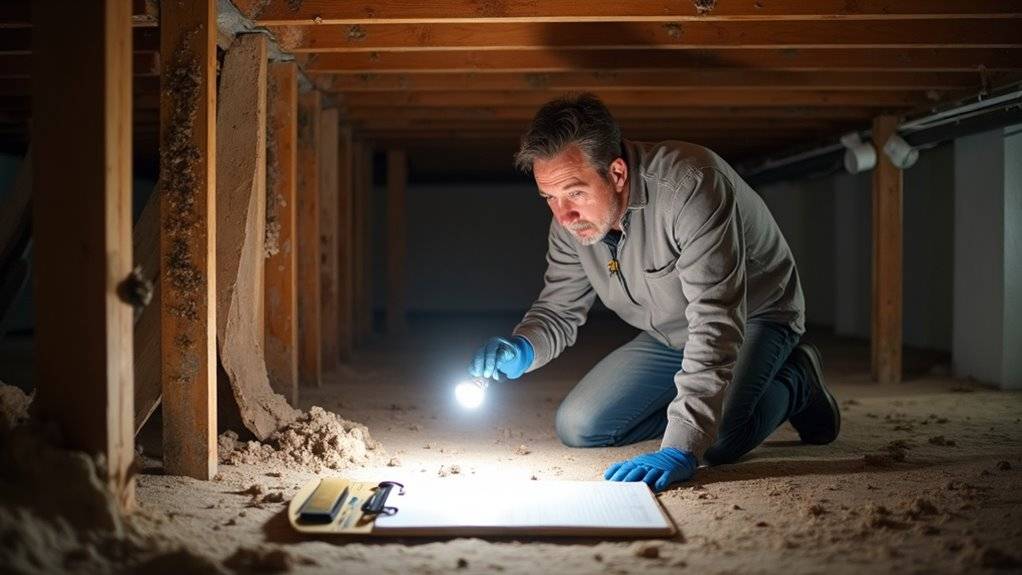Selling a home with pest problems is tough. Many buyers worry about extra costs and hidden damage. This can make your home hard to sell and lower its value.
Potential buyers may walk away after inspections. Some may ask for big price drops. Legal troubles can arise if you hide pest issues. The best way to find a buyer for a home with pest problems is to be honest, prepared, and strategic.
You can attract serious buyers by showing proof of treatment and being upfront. This helps you avoid legal issues and get a fair price. This blog will guide you through each step so you can sell your pest-affected home with confidence.
Key Takeaways
- Disclose all pest issues and recent treatments upfront in listings and provide inspection reports to build buyer trust.
- Highlight the home’s positive features and investment potential to attract investors and fixer-upper buyers.
- Obtain and share multiple pest control quotes to demonstrate proactive management and transparency.
- Work with experienced real estate agents familiar with selling homes with pest problems for targeted marketing and pricing guidance.
- Consider companies that buy homes as-is for a quick, hassle-free sale without making repairs or pest treatments.
Assessing the Extent of the Pest Problem

To know how bad the pest problem is, inspect your home carefully. Check basements, attics, and crawl spaces for droppings, gnaw marks, or nests. Listen for odd noises and look out for strange smells. Additionally, proper maintenance of your property can prevent pest infestations from worsening.
If you find small signs of pests, try simple fixes like traps or natural repellents. These can solve minor problems quickly and cheaply. If pests are everywhere, call a professional for a full check. Understanding damage and health risks associated with pests can help you address issues more effectively.
Understanding Local Disclosure Laws
You need to know exactly what your state requires when it comes to disclosing pest issues to potential buyers. Failing to provide full disclosure can lead to legal trouble and jeopardize your sale. Stay compliant and protect yourself by understanding these laws before listing your home.
Additionally, understanding local disclosure laws can help you navigate potential legal complications related to property condition and ensure you meet all statutory obligations. Knowing your state-specific requirements can prevent delays or disputes during the sale process.
Required Pest Problem Disclosures
You must tell buyers about any pest problems when selling your home. Most state and local laws require you to share this information. If you hide infestations or treatments, you could face legal trouble.
Buyers want to know about pests because it affects the value of the home. You should list all pest incidents, treatments, and prevention steps. Honest disclosures help buyers trust you and may make the sale easier.
If your state has special forms, make sure to use them. A real estate agent can help you with this process. Proper disclosures help set honest expectations and keep your sale on track.
Legal Consequences of Nondisclosure
Not disclosing pest problems can lead to legal trouble. You may face lawsuits, fines, or lose the sale. Most states have laws that require you to tell buyers about pest issues.
If you hide pest problems, buyers can sue you in court. Judges often make sellers pay for pest removal and repairs. Local authorities may also fine you for breaking disclosure laws.
If a buyer cancels due to nondisclosure, you will waste time and money. You must relist your property and start over. This can delay your plans and cost you more.
You should learn your state’s disclosure rules before selling. Always keep records of pest control treatments. Full honesty protects you from legal issues and helps buyers trust you.
If you have questions, talk to a real estate expert who knows local laws. This can help you avoid mistakes. Good advice makes the sale process smoother.
Hiring a Professional Pest Inspector

You’ll want to schedule a professional pest inspection early to catch any issues before buyers do. A skilled inspector can uncover hidden infestations that might otherwise go unnoticed, safeguarding your deal from last-minute surprises. With a detailed inspection report in hand, you’ll have the documentation needed to address concerns upfront and strengthen buyer confidence.
Ensuring proper disclosure of pest damage is also essential to remain compliant with Virginia law and avoid legal complications. Additionally, understanding the market conditions can help you determine the urgency of addressing pest issues to facilitate a quicker sale.
Importance of Early Inspection
Early inspection helps spot pest problems before they get worse. Quick action protects your home’s value and attracts more buyers. If you wait, pests can lower your price or scare buyers away.
A professional inspector knows how to find pests and their hiding spots. This expert can tell if you have a small issue or a big infestation. If you use a professional, you get better results than with DIY methods.
The inspector will carefully check basements, attics, and crawl spaces. Entry points and hidden damage are identified. If pests are found, you get advice for a long-term fix.
You will receive a report to show buyers. This document can support your asking price if needed. Early inspection gives you a plan and builds buyer trust.
Identifying Hidden Infestations
Hidden infestations are problems that are not easily seen during a normal inspection. Termites, rodents, and other pests often hide in hard-to-reach places. These hidden issues can affect the sale of your property if not addressed early.
A professional pest inspector can find pests using special tools and experience. If you hire an expert, they can check inside walls, under floors, and in attics. This helps make sure no hidden problem is missed.
Inspectors can also suggest the best ways to prevent future pest problems. They recommend products and treatments that fit your property’s needs. If you act early, you protect your home’s value and show buyers you are responsible.
Inspection Report Benefits
A pest inspection report helps your home stand out in the market. It shows buyers that you have taken steps to prevent pest problems. Buyers can trust your home because you are open about its condition.
The report gives certified proof of pest control measures. It lists any signs of pests like termites, rodents, or insects. If you use organic treatments, the report highlights these eco-friendly actions.
A clear plan for future pest control is also included. This reassures buyers who worry about health and safety. If your home has this report, serious buyers may feel more confident making an offer.
Getting Multiple Pest Control Quotes

Getting several pest control quotes helps show buyers you are addressing the pest issue seriously. Multiple quotes also make your actions transparent and clear to buyers. If you provide different estimates, buyers can see you are open about the home’s condition.
Offering cash home buyers in Elkton your pest treatment options demonstrates your commitment to a smooth transaction. Each company may suggest different treatments. For example, one may offer general pest prevention, while another might focus on termites only. Comparing these helps you choose the best and most affordable option.
If you share these quotes with buyers, you build their trust. Buyers may feel more confident about your home’s care. This approach also shows your willingness to solve problems before selling. Additionally, understanding liens and encumbrances on your property can further reassure buyers that you are proactively managing the home’s issues.
Weighing the Costs and Benefits of Treatment
You need to weigh treatment costs against the *powerful* boost in your home’s value before making a decision. Consider how addressing pest issues now can prevent larger expenses and buyer hesitation later. By analyzing both immediate expenses and long-term impact, you’ll make a strategic choice that aligns with your selling goals.
Additionally, understanding building code compliance can help ensure that necessary repairs meet legal standards and avoid future violations. Ensuring proper documentation and adherence to local regulations can further streamline the sale process and protect you from potential legal issues.
Treatment Expenses Versus Value
Sellers should weigh pest treatment costs against the increase in home value before selling. If the expense is high, it may not add enough value. Buyers may expect a pest-free home, but not all treatments pay off.
Professional pest control bills can grow quickly. If similar homes sell for more due to better condition, treatment may be worth it. Untreated pest issues can lead to lower offers or buyers leaving.
A clear pest treatment record may help sell your home faster. It can also make negotiations easier. Choose solutions that add value and attract buyers.
Long-Term Impact Assessment
Pest treatments can affect your home’s value and ability to sell. If you treat infestations early, you may avoid costly repairs. Untreated pests can cause damage that lowers your property’s worth.
Some treatments use chemicals, which may worry buyers about health or environmental effects. If you choose safer methods, your home may appeal to more people. Buyers often prefer homes that are pest-free without strong chemical use.
If you invest in full pest treatment, you could see a higher sale price or a faster sale. Homes with a pest-free record and a transferable warranty are more attractive. If you want your home to stand out, it helps to keep pests away for the long term.
Deciding Whether to Sell As-Is or Repair
If you are deciding whether to sell as-is or repair, compare the costs and benefits. Repairs can raise your home’s value but may cost more upfront. Selling as-is often leads to faster sales but usually means lower offers. Homeowners should check their budget for pest repairs and possible returns. Buyers like proof that pest issues are fixed, so keep records of all repairs. If you sell as-is, investors and cash buyers may be most interested.
Market trends and buyer expectations in your area can affect your choice. If repairs are affordable and boost value, consider fixing the problems. If you cannot afford repairs, selling as-is may be a better option. Being aware of the legal risks involved in undisclosed defects is crucial when selling as-is, to avoid potential lawsuits. Additionally, understanding how market conditions influence offers can help you set realistic expectations and choose the best selling approach.
Setting a Realistic Asking Price
You need to adjust your asking price to reflect the home’s pest issues while staying competitive with similar properties in your area. Analyze recent sales of comparable homes, factoring in the cost and extent of necessary pest remediation. By pricing strategically, you attract serious buyers and set clear expectations from the start.
Utilize accurate market data to ensure your pricing aligns with current demand and comparable sales. Additionally, understanding the legal and liability considerations associated with properties affected by pests can help you set a realistic price that accounts for potential health hazards and necessary disclosures.
Factoring Pest Issues
Pest problems can lower a home’s value. The asking price should match the property’s real condition if pests are present. Buyers will consider the cost and hassle of fixing these issues.
Sellers must evaluate and reveal all pest concerns before setting a price. Honest pricing attracts buyers who know what repairs are needed. If you ignore pest issues, negotiations may fail later.
Pest problems can affect how your home looks during showings. They may also make your property less appealing than nearby homes without pests. Visible damage and repair costs can lower buyer confidence, especially for first-time buyers or investors.
Comparing Local Market Rates
To set the right price, compare your home to similar homes nearby. Look at recent sales of homes with or without pest problems. This helps you see how buyers value pest prevention or treatments.
Buyers usually expect a lower price for homes with unaddressed pest issues. If a home has had termite treatments, expect a small drop in value. Homes with no pest history often sell for more.
If you recently fixed pest problems, keep records as proof. These documents can help justify your asking price. Buyers may feel more confident if you show evidence of pest control.
Crafting an Honest Property Listing
Listing a home with pest problems requires honesty. You should clearly share the type and extent of any pest issues. This helps buyers trust you and avoids future legal trouble. Be upfront about pest issues when listing your home—clear disclosure builds trust and helps prevent legal complications down the line.
If you have had recent garden maintenance, mention it. You can also share details about any pest control treatments. Buyers may appreciate knowing that you have worked with reliable service providers.
If there is an ongoing treatment plan, make sure to disclose it. You should name the specific pests if possible. The neighborhood’s good reputation for honesty and care can also be included.
An honest listing can attract buyers who value clear information. Serious buyers are more likely to respond if you are upfront. This saves time for both you and the buyers.
Additionally, highlighting your willingness to work with local pest control professionals demonstrates transparency and commitment to resolving issues, which can increase buyer confidence.
Highlighting the Home’s Positive Features
Highlighting your home’s best features helps buyers see its value. If you openly address pests, you can then focus on the positives. Buyers want honesty, but they also want to see what makes your home special.
A well-kept garden or mature trees create a strong first impression. Fresh mulch and colorful flowers can increase curb appeal. These touches show the home is cared for.
Inside, modern fixtures and new paint make any space feel fresh. Well-maintained floors and updated lighting improve the look of each room. These upgrades may offset concerns about pests.
Natural light and functional spaces are important to buyers. If you have made recent improvements, mention them. Professional photos can help buyers notice these strengths.
If buyers see the home’s positive aspects, they may worry less about minor issues. Highlighting value positions your home well in the market. Honest disclosure, paired with strong features, builds trust.
Attracting Investors and Fixer-Upper Buyers
Investors and buyers who want fixer-uppers often look for homes with problems like pests. These homes can be cheaper and offer a chance for a better deal. If you want to attract these buyers, show your home as a good opportunity with potential.
If the home is in a good neighborhood, mention its location and nearby amenities. A cosmetic update and pest control can make the property much more appealing. Buyers will value a home’s future potential, not just its current state.
Highlight the large lot size if it exists, as investors like more space. If the backyard is big, mention its suitability for outdoor living. Overgrown gardens can become attractive with landscaping after repairs.
If the house has strong structure, let buyers know it allows for creative upgrades. Good access to parks, schools, or shops should be listed as a benefit. Use clear pictures and descriptions to help buyers imagine improvements.
Working With Real Estate Agents Experienced in Problem Properties
Working with a real estate agent who knows problem properties is important when selling a home with pests. Such agents understand how to attract buyers interested in fixer-uppers or investment properties. They know what buyers in your area are looking for.
An experienced agent can suggest small changes, like improving the yard or staging rooms, to make your home look better. If you need help, they can recommend what to fix first. Agents also know how to talk honestly about pest issues to avoid surprises later.
A good agent will help you set a fair price based on your home’s condition. They will collect documents, such as pest inspection reports, if buyers ask for proof. This preparation can make the sale process smoother.
Negotiating With Potential Buyers
Negotiating with potential buyers means being clear and honest about pest issues. You should always tell buyers about any pest problems or treatments. If you keep buyers informed, you are more likely to keep negotiations smooth.
Sellers should share recent pest inspection reports and receipts. Buyers want to see proof that you handled the problem. You can also mention any regular pest prevention steps you take.
Offering a home warranty that covers pest repairs can help ease concerns. If buyers ask, you can consider giving credit for future treatments. These steps build trust and help you finish the sale.
Utilizing “We Buy Houses” Companies
“We Buy Houses” companies can help if you have trouble selling a home with pest issues. These companies buy houses in any condition. You do not need to fix pest problems or make repairs.
If your home has pests, it may stay unsold for a long time. Traditional buyers often want homes that are move-in ready. “We Buy Houses” companies make cash offers and close quickly.
You can avoid cleaning, repairs, or pest control when selling to these companies. If you need to sell fast, this is a good option. This choice is best if you value speed and ease over getting the highest price.
Preparing for Buyer Inspections and Appraisals
If you plan to sell your home, you must get ready for buyer inspections and appraisals. These steps are necessary if your home has pest issues. Buyers and inspectors will look closely for any signs of problems.
Home staging can help your home look better to buyers. You should also work on your yard and entry to improve curb appeal. If you fix pest issues early, buyers will feel more confident.
Remove all visible pest traces, like droppings or damaged wood, before any visits. Clean and paint the home to make it look fresh. If you have receipts or reports for pest control, keep them ready for buyers.
Proper documentation shows you have taken care of the problem. If you address these issues first, your home will stand out. Buyers will see your home as a safer choice.
Conclusion
If you need to sell a home with pest problems, you still have options. If you disclose issues and provide documentation, buyers may consider your property. If you use the right approach, you can attract investors or buyers looking for a project.
If you want a fast and simple sale, we buy houses for cash in any condition. If you choose this route, you can avoid repairs and lengthy negotiations. If you work with experts, you may sell your home more easily than you expect.
If you are ready to move forward, we can help you at Align Real Estate Solutions. If you contact us today, we will discuss your options and make a fair cash offer. If you want a hassle-free sale, let’s start the process together.
Author
-

Zach Koops is co-founder and Real Estate Success Manager at Align Real Estate Solutions, serving homeowners across Virginia since 2024. With a passion for real estate and a heart for people, Zach has built his career around helping sellers navigate tough situations—foreclosure, inheritance, relocation, repair-overload—with clarity and compassion. He’s known for being straightforward, steady under pressure, and deeply invested in relationships. Outside of work, he spends his time as a husband and father, enjoys the outdoors in Shenandoah Valley, loves singing on stage, and constantly seeks growth through reading and new experiences.










